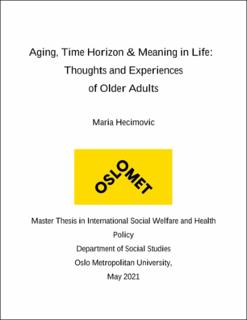Aging, Time Horizon & Meaning in Life: Thoughts and Experiences of Older Adults
Abstract
According to the socioemotional selectivity theory (SST), people tend to assess their remaining
life span, as being either limited or expansive. SST theorizes that perceived time in life shapes goal
pursuits, preferences, and emotional well-being. In detail, older adults who have perceived time as
limited focus on immediate need gratification, not in future investments, and are also very much
focused on their emotional wellbeing. According to the psychosocial development theory,
aggregated changes in social roles bring about different life goals that individuals strive to achieve
to promote development. I investigated meaningful goals that older adults hope to achieve before
they die. I also explored the meanings that older adults attach to life during later stages in their
life.
Data were collected through personal interviews after selecting my informants through
convenience sampling techniques. Results showed that older adults are very conscious of the time
horizon. However, the length of a time horizon is very subjective to the individual. The findings
of the study also showed that the meanings people attach to the time horizon is very subjective,
and may be influenced by individual goals and aspirations, culture, religious believes and the
environment in which one finds himself/ herself.
